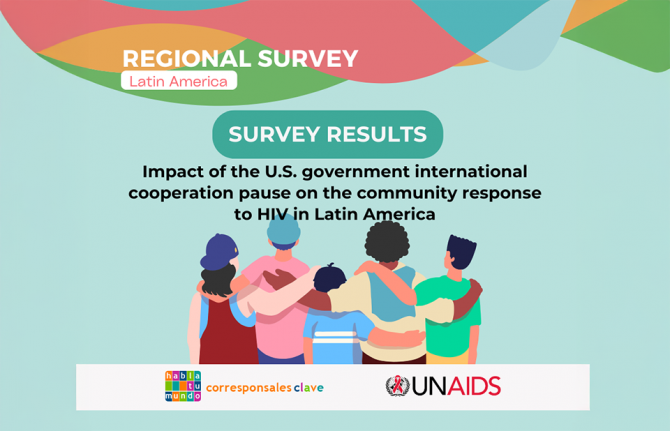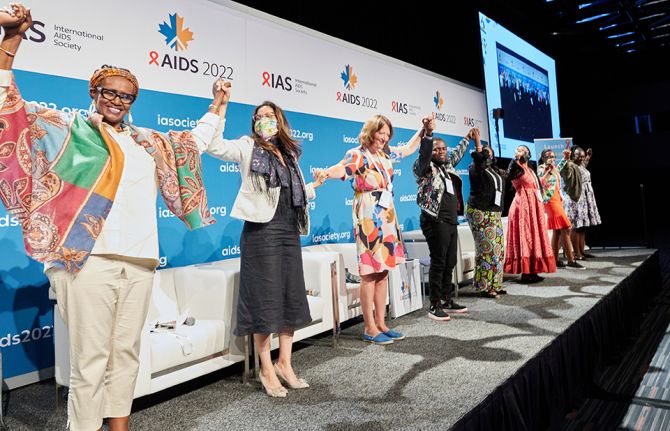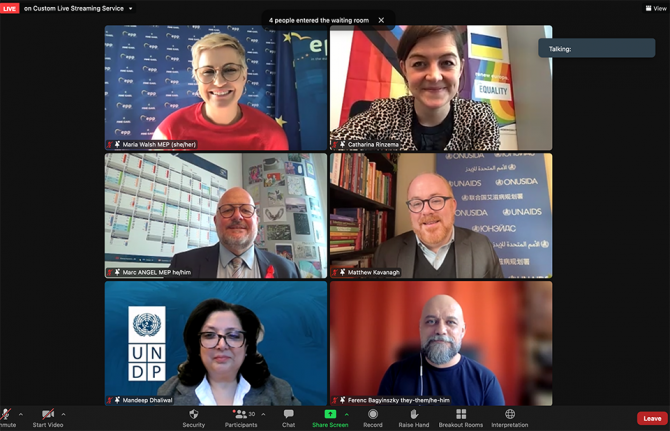
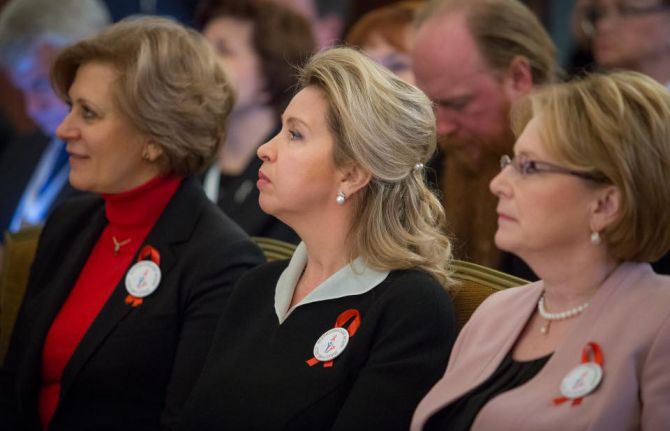
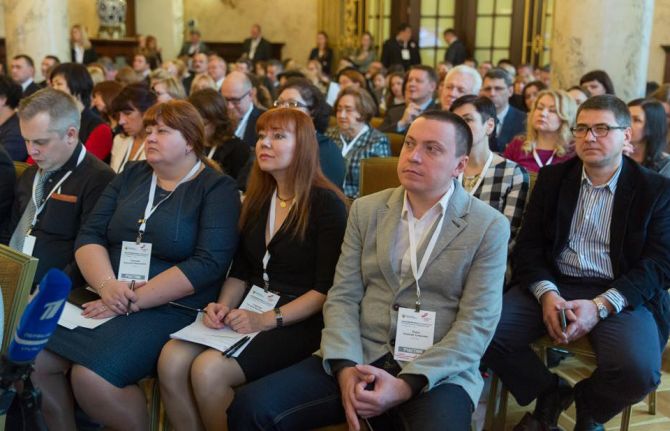
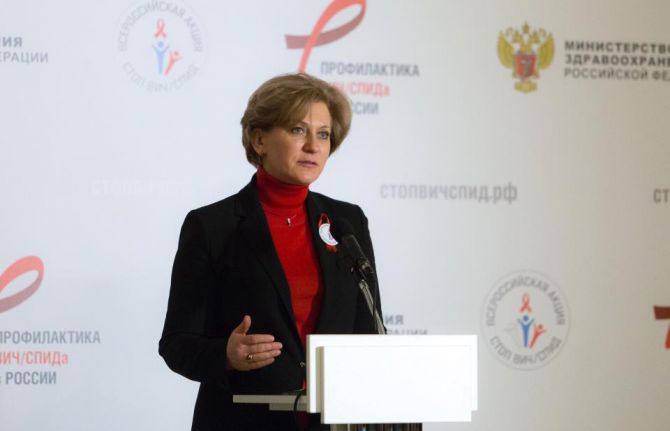
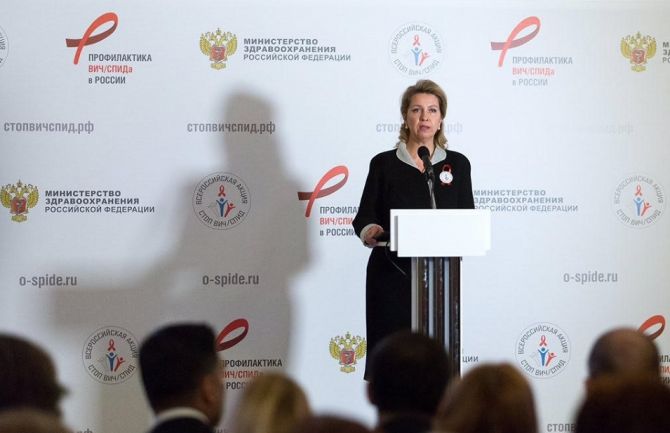
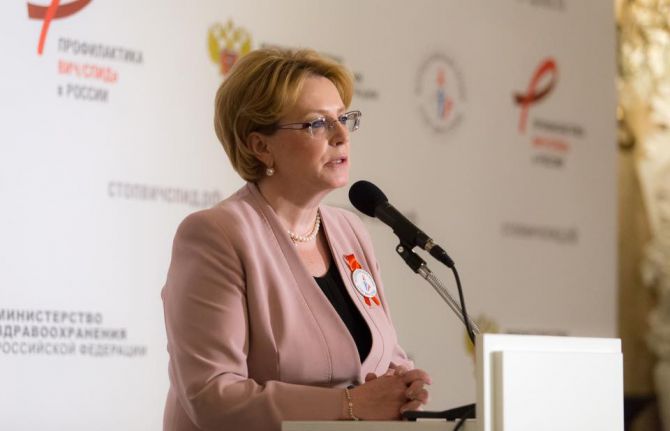
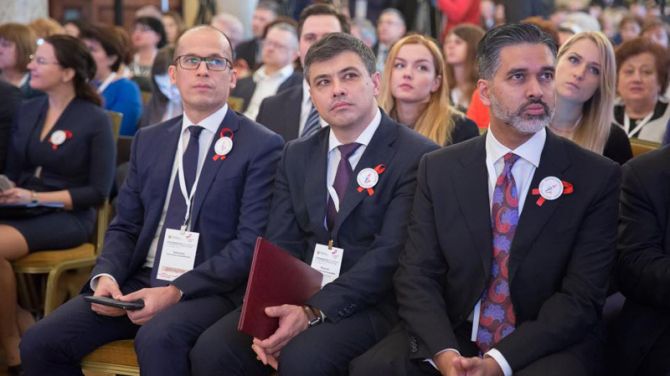
Update
Russian #STOPHIVAIDS HIV prevention campaign launched
29 November 2016
29 November 2016 29 November 2016A national HIV prevention campaign, #STOPHIVAIDS, has been launched in Moscow, Russian Federation, by Svetlana Medvedeva, spouse of the Russian Prime Minister, with the participation of the ministries of health, education and communications and the Russian agency for consumer protection, Rospotrebnadzor.
The campaign was launched at the Second Forum on HIV Prevention and Treatment, organized by the Foundation for Social and Cultural Initiatives and led by Ms Medvedeva and the Russian Ministry of Health. The event united 500 experts and partners from across the Russian Federation to discuss the implementation of the new state strategy on HIV for 2017 to 2020, which was recently approved by the Prime Minister.
Under the slogan #STOPHIVAIDS, the campaign will run on television and social media platforms, featuring Russian celebrities talking about HIV awareness, prevention and stigma and discrimination. The week-long campaign also includes public events, film screenings and free anonymous express HIV testing and counselling. HIV prevention leaflets will be distributed in the six largest railway stations in Moscow and passengers will be invited to be tested for HIV.
The campaign will also feature an online Internet lesson, Knowledge–Responsibility–Health, designed for young people. HIV awareness events are also planned in secondary schools, military bases and juvenile correctional facilities.
The Russian Federation has the largest HIV epidemic in the region, with more than 100 000 new HIV infections reported by the government in 2015. UNAIDS estimates that 1.5 million people were living with HIV in eastern Europe and central Asia in 2015, up from 1 million in 2010.
Quotes
“The main objective of this initiative is to inform people about HIV prevention and diagnosis, as well as to develop responsible behaviour among young people. Particular attention is paid to information for high-school students, military personnel and young people in prison.”
“According to preliminary data for 2016, the number of healthy babies born to HIV-positive mothers has increased by 16% compared with the previous year, exceeding 98.2%. We hope that in the near future our country will end mother-to-child transmission of HIV.”
“We know what to do and our country has all the expertise and tools to stop AIDS. We just need to move forward together, cooperating closely with civil society in reaching key populations at higher risk of HIV infection.”
“We welcome this unprecedented, high-level public mobilization on HIV in the Russian Federation. This approach is fully consistent with the call of the 2016 Political Declaration on Ending AIDS for countries to get on the Fast-Track to end AIDS.”
Multimedia
Region/country
Related

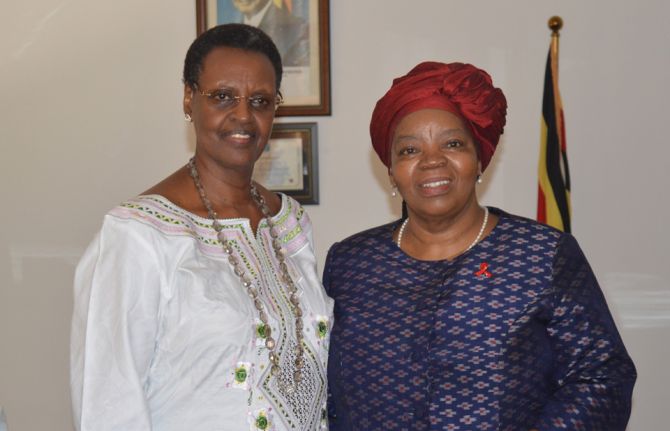
Update
Uganda’s leadership ready to Fast-Track the AIDS response
29 November 2016
29 November 2016 29 November 2016The Director for the UNAIDS Regional Support Team for Eastern and Southern Africa, Sheila Tlou, has visited Uganda to advocate for accelerated action to address the trend of rising new HIV infections in the country. According to UNAIDS data, 360 new HIV infections occur per week in Uganda among adolescent girls and young women aged 15–24 years.
Uganda has been identified as one of the Fast-Track countries globally that can make a significant contribution to ending AIDS as a public health threat by 2030.
Ms Tlou congratulated the First Lady of Uganda, Janet Museveni, for the country’s efforts to prevent mother-to-child transmission of HIV. Uganda saw a drop in new HIV infections among children of 86% from 2009 to 2015.
The First Lady took note of the commitment by UNAIDS to support the delivery of a country-specific sexual health educational programme that reflects the will and values of the Ugandan people. Comprehensive sexuality education, championed by UNAIDS, is a critical aspect of empowering young women to prevent HIV infections.
While in Uganda, Ms Tlou also met with the King and Queen Mother of the Tooro Kingdom and the Speaker of Parliament, Rebecca Kadaga.
Quotes
“Thank you that you never give up; you motivate us and inspire us. We want to effect drastic change in Uganda to stop the spread of HIV, so continue to walk with us.”
“Fast-Track requires leaders like those we have in Uganda, who have remained committed to championing the response to HIV.”
Region/country
Related

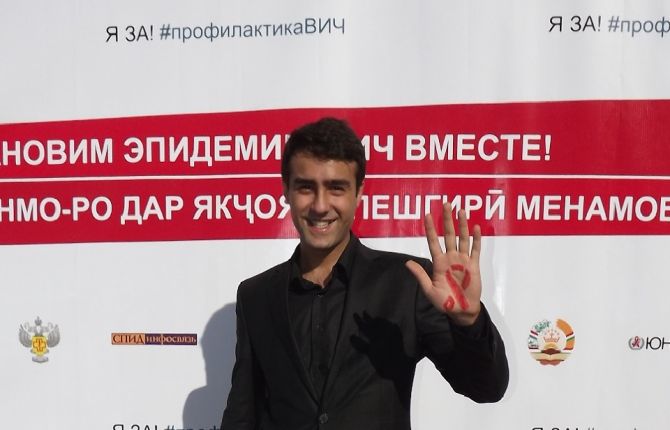
Update
Tajikistan joins “Hands up for #HIVprevention”
24 November 2016
24 November 2016 24 November 2016The Minister of Health of Tajikistan, Nusratullo Salimzoda, called for people to know their HIV status during the first ever public event on HIV prevention in Dushanbe, Tajikistan, on 15 November.
The event, in support of the “Hands up for #HIVprevention” campaign, united more than 500 representatives of the Government of Tajikistan, health professionals, celebrities and young people. Organized at the newly opened city medical centre, the campaign offers local citizens access to free and voluntary rapid HIV tests, access to condoms, information on how to protect against HIV infection and referrals to treatment and support for people living with HIV.
During the event, a new mobile diagnostic complex was donated to the Government of Tajikistan by the Russian Government under the framework of the Regional Cooperation Programme—a joint project of UNAIDS, AIDS Infoshare, and Rospotrebnadzor. The medical centre will operate in remote mountainous and rural areas in Tajikistan and will provide population at higher risk of HIV infection, including migrants and their families, with access to integrated HIV testing and counselling and other forms of medical diagnostics and treatment.
UNAIDS estimates that there were 1000 new HIV infections and that 16 000 people were living with HIV in Tajikistan in 2015.
Quotes
“We call on everyone to get tested for HIV and know their HIV status.”
“Tajikistan has supported new ambitious targets to end the AIDS epidemic by 2030. Yet, we can only reach those targets if people at higher risk of HIV infection, including migrants, know their HIV status and have access to critical HIV services.”
“The Russian Federation works actively with other countries in eastern Europe and central Asia in the field of HIV prevention, control and surveillance within the framework of the Regional Cooperation Programme. Thanks to this programme, the Ministry of Health of Tajikistan has strengthened its capacity to address the complex medical and social problems of HIV, hepatitis and other infectious diseases.”
“It is time to start speaking openly in Tajikistan about the importance of HIV prevention. Every young man and woman who is sexually active should know their HIV status. We must do everything to prevent exclusion of and discrimination against people living with HIV.”
Hands up for #HIVprevention — World AIDS Day campaign
Region/country
Related





Update
First Lady of Namibia takes part in conversations with young people at Windhoek nightclub
19 November 2016
19 November 2016 19 November 2016The club was packed. There was dancing, loud music and something you don’t typically find in a nightclub setting—intense dialogue.
The kick-off for the First Lady’s #BeFree initiative brought together young people, parents, counsellors, dancers, musicians, religious leaders, health experts, United Nations partners and other community stakeholders for an afternoon event at a nightclub in Windhoek, Namibia. #BeFree aims to give young people the information, knowledge and tools needed to transition into adulthood.
The First Lady of Namibia, Monica Geingos—who was recently appointed UNAIDS Special Advocate for Young Women and Adolescent Girls and champions the Start Free, Stay Free, AIDS Free agenda—wanted to create an environment where young people would be comfortable talking about the challenges they face growing up and what it will take for them to feel empowered to make smart life decisions.
One parent dropped off her daughters for the event and ended up staying after hearing a few of the more than 100 participants aged 15–24 years speak from the heart. Panel discussions covered a range of issues, including contraception, economic empowerment, HIV and other sexually transmitted infections and the need to address gender-based violence. Young people were encouraged to share their own stories—you could hear a pin drop when a young man told his story about the consequences of poor decision-making that changed his life for ever and made him an inmate at the Windhoek Correctional Facilities—and counsellors were on hand to provide advice and care.
Quotes
“Young people should not have to suffer in silence, but find someone they can speak to about what they are going through. Young people must be free to make informed decisions about their lives.”
“Why do we feel the need to impress others at what could be a great cost to ourselves.”
“Communication is essential and children and their parents must find better ways to talk with each other.”
“Young people’s engagement is key to achieving the Start Free, Stay Free, AIDS Free targets and ending AIDS in Namibia by 2030.”

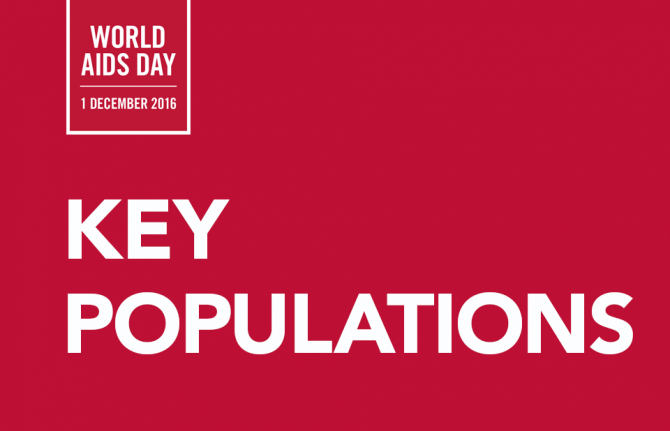
Update
HIV prevention among key populations
21 November 2016
21 November 2016 21 November 2016Since 2010, the annual global number of new HIV infections among adults (15 years and older) has remained static, at an estimated 1.9 million. Members of key populations, including sex workers, people who inject drugs, transgender people, prisoners and gay men and other men who have sex with men, and their sexual partners accounted for 45% of all new HIV infections in 2015.
In some countries and regions, infection rates among key populations are extremely high—HIV prevalence among sex workers varies between 50% and 70% in several countries in southern Africa. One study from Zimbabwe found HIV prevalence rates of 27% for male inmates, 39% for female inmates and 60% for sex workers, with 9.6% of these getting newly infected between 2009-2014. New infections among gay men and other men who have sex with men have been increasing in all regions in recent years. Across countries, key populations are between 10 and 50 times in greater risk of HIV infection compared to other adults.
Criminalization and stigmatization of same-sex relationships, sex work and drug possession and use, and discrimination, including in the health sector, are preventing key populations from accessing HIV prevention services. Effective government support and community-based and implemented HIV prevention and treatment programmes that provide tailored services for each group are currently too few and too small to result in a significant reduction in new infections.
In order to achieve the target of reducing new HIV infections among key populations by 75% by 2020, a large-scale increase of programmes and the creation of an enabling social and legal environment are needed.
Hands up for #HIVprevention — World AIDS Day campaign

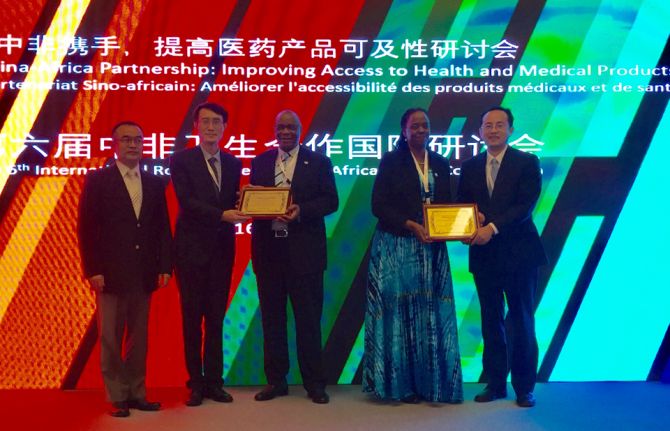
Update
UNAIDS wins award for China–Africa health cooperation
21 November 2016
21 November 2016 21 November 2016The UNAIDS Country Director for China, Catherine Sozi, has received an award for her exceptional contribution to health cooperation between China and Africa. The China Alliance for South–South Health Cooperation Research presented Ms Sozi with the special award during the 6th International Roundtable of China–Africa Health Cooperation on 22 November in Shanghai, China.
Ms Sozi has helped to strengthen China’s collaboration with Africa, especially around increasing access to medicines and health commodities. She has supported China’s efforts to scale up Africa’s pharmaceutical industry, helping to ensure that the more than 25 million people living with HIV on the continent access life-saving HIV treatment.
Africa imports 80% of its antiretroviral medicine from Asia, with many of the ingredients coming from China. The China–Africa Development Fund is supporting the local production of medicines and health commodities in Africa through joint ventures with China. Ms Sozi has advocated for an equal partnership that puts the needs of Africa at the centre of the dialogue for collaboration.
Quotes
“This award is to indicate the China Alliance for South–South Health Cooperation Research’s appreciation for Catherine Sozi’s and UNAIDS’ contribution to our joint work on China–Africa health collaboration and our commitment to making this world a healthy place.”
“I am very honoured to accept this special award. I believe it highlights how together we are stronger. Through this key partnership, we can ensure that millions of Africans have sustained access to HIV treatment.”
Region/country


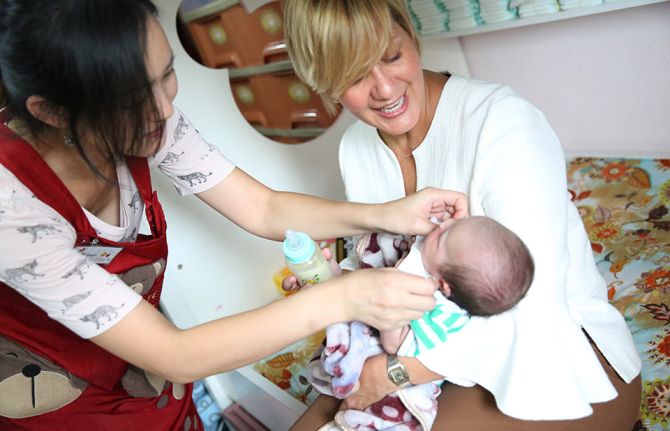
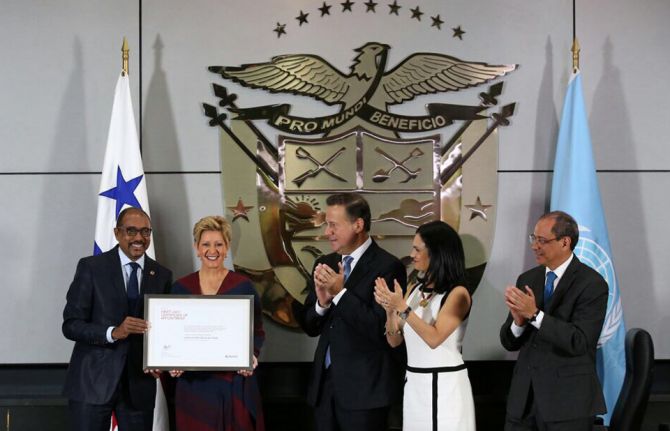
Update
Lorena Castillo de Varela renews her commitment as UNAIDS Special Ambassador for AIDS in Latin America
18 November 2016
18 November 2016 18 November 2016UNAIDS has announced that Lorena Castillo de Varela, First Lady of Panama, will continue her commitment to the response to HIV as UNAIDS Special Ambassador for AIDS in Latin America. Since her appointment in November 2015, Ms Castillo de Varela has contributed to accelerating the AIDS response in Panama and to raising awareness about zero discrimination, calling for fairer and more inclusive societies.
Ms Castillo de Varela is leading the national Be the Transformation You Want to See campaign, which brings together political and religious leaders, celebrities, government institutions, nongovernmental organizations, key populations, health workers and people living with HIV to stand up for human rights and dignity for all. The campaign aims to remove obstacles that block access to health-care services, including HIV testing, and to ensure that health-care settings are safe and caring environments.
Ms Castillo de Varela has also made important contributions to increasing access to HIV testing through the nationwide Tests Save Lives campaign and the Love on Wheels initiative. The latter provides access to health-care services, including HIV testing, for women living in rural and remote areas through mobile clinics.
In the past year Panama has shown progress towards ending AIDS as a public health threat by 2030 and has invested more than US$ 38 million in the AIDS response. The Ministry of Health has created 15 clinics to provide health care-services to members of key populations and has put in place a training programme for health-care workers to strengthen primary health care for people living with HIV.
The First Lady of Panama has advocated for investing more in the HIV response at the regional and global levels.
Quotes
"My vision and mission are to improve access to health services for people living with HIV, eliminate mother-to-child transmission of HIV and eradicate discrimination."
“I couldn't be more satisfied with the accomplishments of Lorena Castillo de Varela. Her passion and commitment are allowing us to move forward towards the Fast-Track Targets in Panama and has mobilized the entire population around the goal of zero discrimination.”

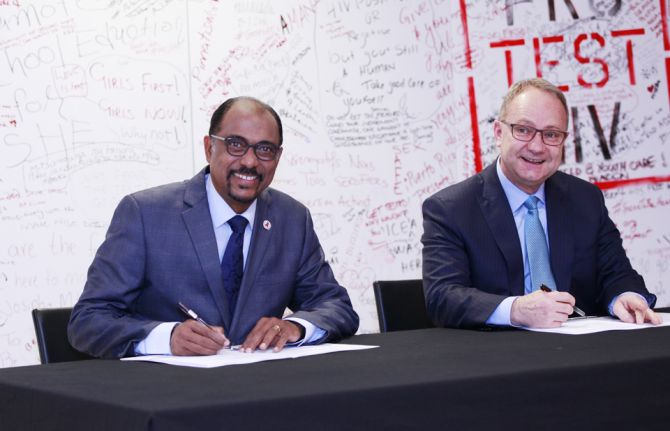
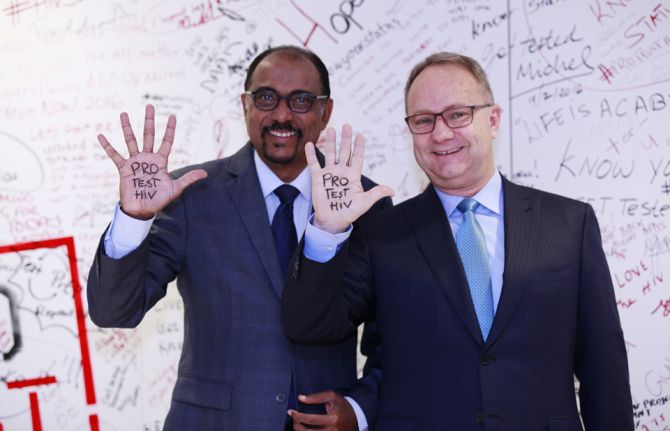
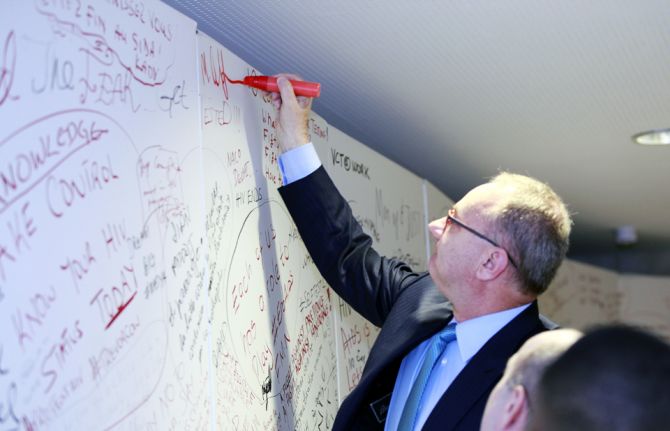
Update
HIV is everybody’s business
15 November 2016
15 November 2016 15 November 2016UNAIDS and Anglo American, one of the world’s largest mining companies, have announced a public–private sector partnership to promote HIV testing worldwide.
Since the early days of the HIV epidemic, Anglo American has experienced first-hand the impact that HIV and tuberculosis (TB) have had on its employees, their families and their communities. For the past three decades, Anglo American has been at the forefront of developing a comprehensive business sector response to HIV and TB. Today, it has a world-class workplace programme offering free HIV testing, counselling and antiretroviral therapy for its employees and their dependents. Anglo American encourages all employees to know their HIV status.
The Sustainable Development Goals provide a new opportunity for the business sector to engage further in the global AIDS response as a powerful, influential and effective partner. Forward-looking companies, like Anglo American, have already demonstrated success in addressing some of the major challenges raised by HIV and TB through business-led ventures that are impactful, scalable, measurable, replicable and go beyond “business as usual”.
During the International AIDS Conference in Durban, South Africa, in July 2016, a UNAIDS and Anglo American initiative to promote HIV testing reached over 6 million people via social media channels and got over 100 000 “protests” on the ProTest HIV website—www.protesthiv.org. In the run up to this year’s World AIDS Day, 1 December, Anglo American is encouraging all its employees to get tested for HIV and to engage in activities that will help to raise awareness on HIV testing worldwide.
Ending AIDS as a public health threat by 2030 will only be achieved by working together. This new partnership demonstrates the power of collective action in mobilizing people around the world.
Quotes
“Anglo American demonstrates that providing HIV and tuberculosis services isn’t just the right thing to do, it’s also a good investment. Business cannot succeed in societies that fail. We are pleased to partner with Anglo American in promoting HIV testing and encourage companies everywhere to scale up their efforts to end AIDS by 2030.”
“We recognize the profound importance of human rights in shaping our response to HIV, and, for that matter, to any disease. Our approach to HIV is based primarily on a moral imperative: the need for business to realize the right to health for all of our employees. Anglo American has been a pioneer in the AIDS response for over 30 years. In our efforts to achieve an HIV-free generation, collaboration is vital and we are proud to partner with UNAIDS in this effort.”
Hands up for #HIVprevention — World AIDS Day campaign

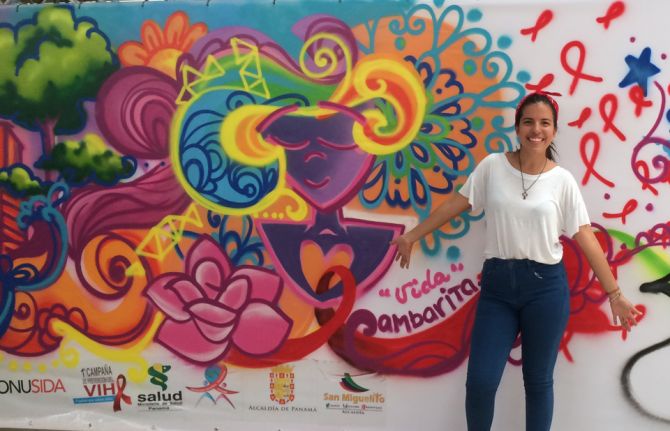
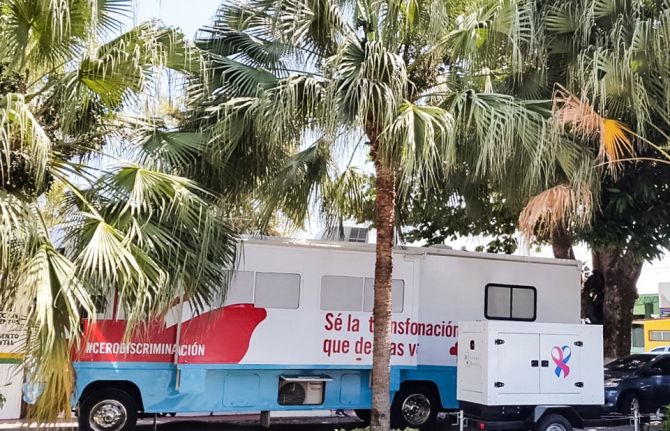

Update
HIV testing campaign in Panama aims to save lives
16 November 2016
16 November 2016 16 November 2016The Tests that Save Lives campaign in Panama, launched within the framework of the Global ProTest HIV initiative, aims to reduce the number of new HIV infections and AIDS-related deaths by offering free HIV testing and counselling every June. When the campaign was rolled out in June 2015, more than 13 100 people were tested for free across the country. That number increased to more than 16 200 in 2016.
Health fairs are held and mobile clinics tour as part of the campaign, which is led by the Ministry of Health, the Social Security Fund, the Office of the First Lady, the Inter-Governmental Network for HIV Prevention, the private sector and civil society.
Owing to the campaign’s success, the government decided in 2015 to make HIV testing free for adolescents and members of key populations in all public health-care facilities. From 2018, HIV testing will be free for everyone in Panama.
First Lady Lorena Castillo de Varela’s Love on Wheels is a complementary initiative offering HIV testing and integrated health care through mobile clinics to women living in marginalized and rural communities.
Panama adopted the Fast-Track Targets in 2015, which, if met by 2020, will allow the world to end the AIDS epidemic by 2030.
Quotes
“Testing is the first step in accessing services to respond to HIV. My commitment is to make the necessary efforts to open this door to HIV care to all people, without discrimination.”
“Panama has made important achievements in a short time in terms of access to HIV testing. This shows that with political commitment, the end of the AIDS epidemic can be reached by 2030.”
“Increasing the testing coverage has been a challenge in terms of advocacy, coordination and implementation, but it is certainly one of the greatest achievements of the national response that puts us closer to reverting the course of the epidemic in Panama.”
Hands up for #HIVprevention — World AIDS Day campaign
Region/country
Related

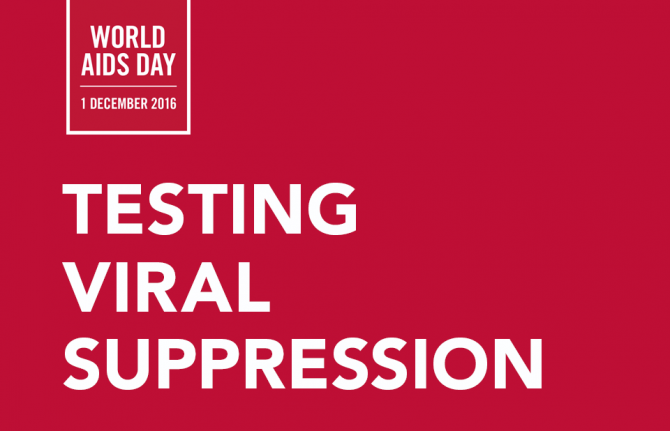
Update
Testing viral suppression
14 November 2016
14 November 2016 14 November 2016Strong adherence to antiretroviral therapy suppresses viral load to undetectable levels within people living with HIV, greatly reducing the risk of transmitting the virus to others. When large proportions of people living with HIV within a community are on treatment, it has been shown to have a preventive effect within that community. Achievement of UNAIDS 90–90–90 treatment target by 2020 alongside high coverage of primary HIV prevention interventions can make the end of the AIDS epidemic a reality by 2030. The 90-90-90 treatment target means that 90% of people living with HIV know their HIV status, 90% of people who know their HIV status are accessing treatment and 90% of people on treatment have suppressed viral loads.
However, the global gap in achieving the 90-90-90 target in 2015 was around 11.9 million people living with HIV who did not know their HIV status, 12.7 million people in need of antiretroviral treatment and 13.0 million people living with HIV who were not virally suppressed.















